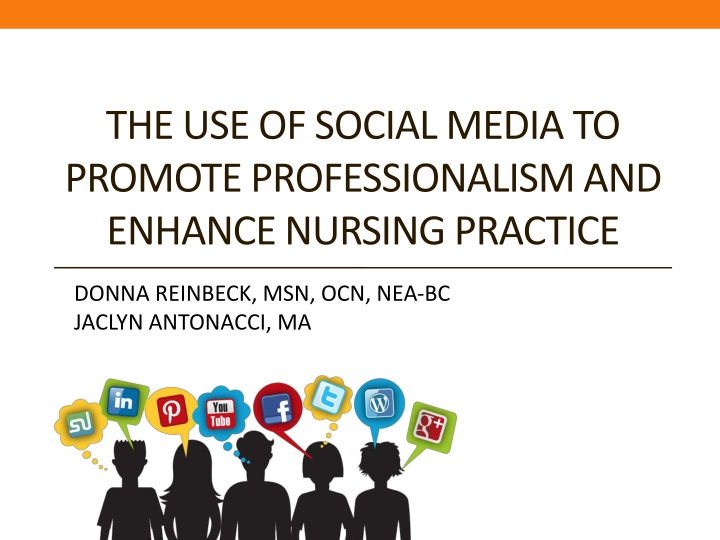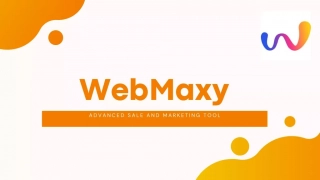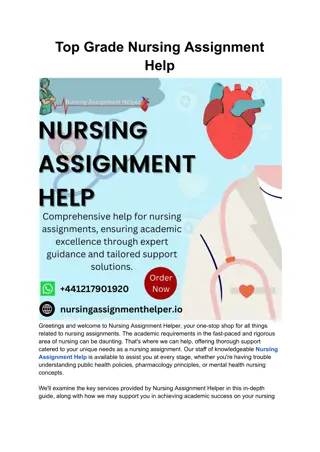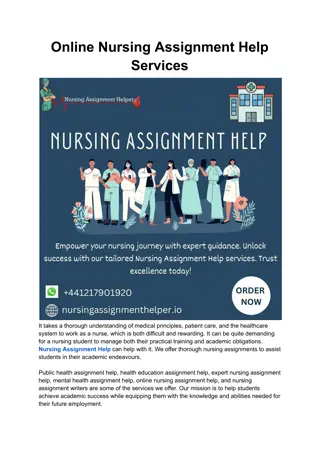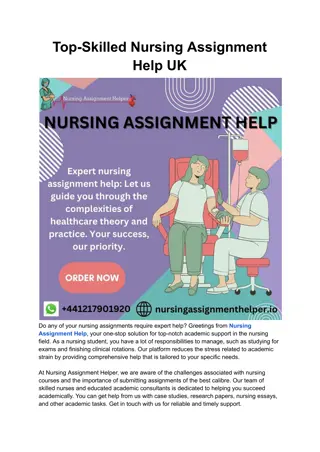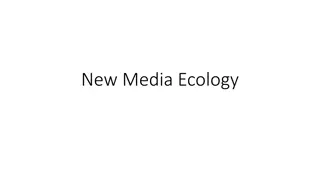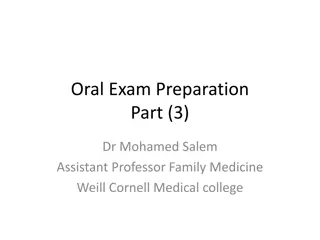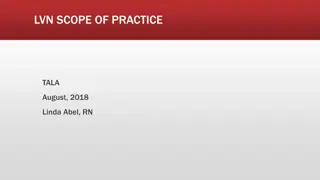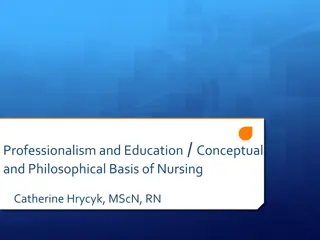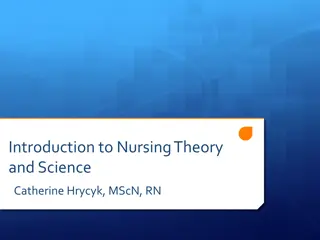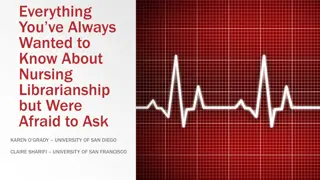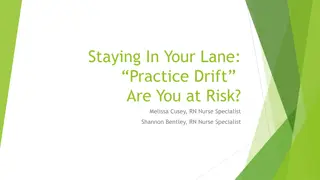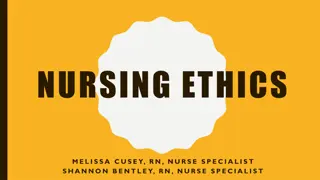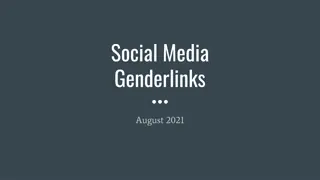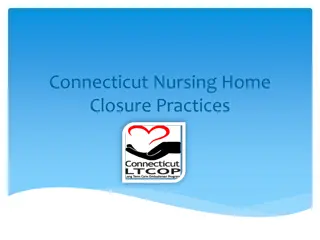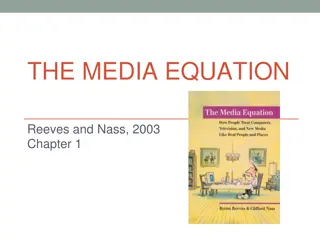Leveraging Social Media for Nursing Professionalism and Practice Enhancement
Donna Reinbeck, MSN, OCN, NEA-BC, and Jaclyn Antonacci, MA, explore the use of social media to promote professionalism and enhance nursing practice. They discuss personal branding, digital identity, and the benefits of developing a strong online presence in nursing. The importance of social media in networking, career growth, and building connections is highlighted through practical strategies for nurses looking to establish a digital personal brand.
Download Presentation

Please find below an Image/Link to download the presentation.
The content on the website is provided AS IS for your information and personal use only. It may not be sold, licensed, or shared on other websites without obtaining consent from the author.If you encounter any issues during the download, it is possible that the publisher has removed the file from their server.
You are allowed to download the files provided on this website for personal or commercial use, subject to the condition that they are used lawfully. All files are the property of their respective owners.
The content on the website is provided AS IS for your information and personal use only. It may not be sold, licensed, or shared on other websites without obtaining consent from the author.
E N D
Presentation Transcript
THE USE OF SOCIAL MEDIA TO PROMOTE PROFESSIONALISM AND ENHANCE NURSING PRACTICE DONNA REINBECK, MSN, OCN, NEA-BC JACLYN ANTONACCI, MA
A bit about us Donna Reinbeck Graduate Coordinator at Kean University at Ocean PhD Student Previously: Director of Oncology, 15+ years in nursing leadership Jaclyn Antonacci Social Media Coordinator at William Paterson University M.A. in Digital Marketing The product of a nurse!
Social Media Websites and applications that enable users to create and share content or participate in social networking.
Personal Branding The process by which individuals differentiate themselves by identifying and articulating their unique value proposition and then leveraging it across platforms with a consistent message and image to achieve a specific goal How we market ourselves to others
Digital Identity Our online presence built by posts, uploads, tweets, photos, videos, and other online contributions. Digital Identity is how we engage, share, promote, and present ourselves online.
Developing a digital personal brand can help you: In your current job In your career search Find new opportunities / partnerships Build rapport Make connections Grow your network
Things to think about before building a purposeful online presence: Who do I stand for? What are my goals? What are my values? What are my passions? What are my strengths? Where would I like to be in 3 years? What is my ideal job?
Digital Identity What did you find? Search Engine Optimization Here s my Google Search. http://www.google.com/webmaster/tools/removals
Use social media purposefully Check your organizations social media policies Things to avoid: Unprofessional behavior of all kinds Posting rude or disparaging remarks Sharing confidential or sensitive information Disclosing patient information of any kind Friending patients on social media Commenting on behalf of your organization Be extra wary when posting photos or other multimedia
About Twitter Users can create short, 140-character messages called Tweets To see another user s tweets, you can follow them. This is similar to friending someone on Facebook. Similar to Facebook, a Twitter user has a feed where they see posts from people they follow. Users can share tweets to their own page by retweeting Hashtags offer users a way to categorize their tweets and join global conversations *
Creating a Twitter Bio Your Twitter bio should reflect who you are, your values, and what you have to offer Your bio is your first impression 160 characters, so be concise! Perfect spelling and grammar Make clear exactly what it is that you do Position yourself as an expert in your field Why should someone follow you?
Accounts to follow: New Jersey State Nurses Association - @NJNurses American Nurses Association- @ANANursingWorld AtlantiCare - @AntlantiCareNJ Meridian Health System - @MeridianNJ Barnabas Health System - @Barnabas_Health American Journal of Nursing - @AmJNurs Robert Wood Johnson Foundation - @RWJF The Centers for Disease Control & Prevention - @CDCgov Oncology Nursing Society - @OncologyNursing
Twitter Hashtags A hashtag (#) is community-driven word or phrase used to identify or label tweets on a specific topic or event. Can be used for events, conferences, places, people, or general topics Including a hashtag in your Tweet is a great way to give your Tweet more exposure Similarly, searching through a hashtag (i.e.: #nursing) is a great way to find relevant users to follow
Remember this? Miss Colorado s 2015 Speech The View #NursesUnite #NursesShareYourStethoscopes
Could you contribute to any of these local or global conversations? #KeanUniversity #NJNurses #AdviceForNewNurses #HealthcareTips #ArtOfNursing #FutureOfNursing #CelebrateNurses
Tips for Tweeting Be authentic Keep audience in mind Think before you Tweet, your posts could be seen by: Your friends, your family, your professors, your community, journalists, current employers, potential future employers Think about context and perception Find a balance between personal and professional posts Spelling and grammar are still essential
LinkedIn World s largest professional network Ranks high in Google searches Has 227 million members Used by recruiters
LinkedIn Completing your profile Complete your profile and keep it updated with the most up- to-date professional information Add keywords to your professional headline and in your summary Mention the tools, software, and concepts you have experience with (Hint: You know Twitter now!) Share links, industry news, your own work, etc.
LinkedIn Build your network Customize your message when adding people Keep an eye on who is looking at your profile Leave recommendations and endorsements for people you ve worked with Use the search function to find people, organizations and groups to follow Here s where you can find relevant groups: https://www.linkedin.com/groups/discover
ResearchGate Communicate with researchers around the world Facebook for science Post your own research Build your network Q&A forum with industry experts. Follow publications and research topics
Becoming Thought Leaders Go-to people in a field of expertise. Trusted sources who move and inspire with innovative ideas; turn ideas into reality, and know and show how to replicate their success. Create a lot of content Use your social media to amplify new thoughts and ideas Leverage your academic and professional experience
Avoiding Social Media Pitfalls Review the social media policy at your place of employment Posts from private accounts can still be shared Maintain professionalism and composure at all times You should never: Complain about/comment on patients Post photographs or videos of patients (even with consent) Rant about your place of employment Use offensive language/create or share offensive posts
Additional Resources - Apps Medscape WebMD Offers access to medical news stories Disease Dictionary Detailed information on medical diseases Epocrates Drug guide with pill interaction information Black s Medical Dictionary Digital version of the reference guide Pill Identifier Search features to for pills without a label MediBabble Translator Helps with translation when working with non-English speakers
Connect with me! Web: www.JaclynAntonacci.com Email: JaclynAntonacci@gmail.com Facebook: www.facebook.com/jaclynantonacci LinkedIn: www.linkedin.com/in/jaclynantonacci Twitter: www.twitter.com/jaclynantonacci
